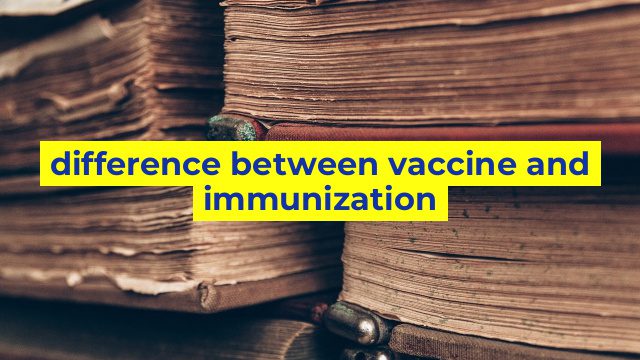Understanding the Difference between Vaccination and Immunization
Introduction
As healthcare and allied fields continue to flourish with new researches, studies, and medical interventions, there still are subtle nuances between terminologies and concepts that create confusion, one of which is the difference between vaccine and immunization. Though both terms are often used interchangeably, they mean two different things. So, it is crucial to understand the difference between the two to avoid any misunderstandings.
What is a Vaccine?
A vaccine is a medicinal product designed to produce immunity (protection from a disease) in the body by stimulating the patient’s immune system to produce antibodies. Vaccines are made up of either a dead, weakened, or modified agent of the disease-causing microbe or a small part of the microbe itself. When injected into the body, the vaccine prompts the immune system to produce antibodies to attack and destroy the disease-causing microbes. The presence of these antibodies in the body creates immunity that will protect the individual from the disease.
What is Immunization?
Immunization is the process by which an individual develops immunity to a specific disease. Immunization is attained when the body produces antibodies to a particular disease-causing microbe, either naturally or by a vaccine. It is important to recognize that while vaccination is one way to achieve immunization, immunization is not only produced by vaccination. Immunization can also occur naturally after a person has contracted a disease and recovered from it. Some infectious diseases, such as measles, mumps, rubella, and chickenpox, impart long-lasting immunity on those who recover.
Differences Between Vaccine and Immunization
A vaccine is a preventive measure against diseases, while immunization is the process by which an individual develops immunity to a particular disease. Vaccines are created to stimulate the immune system to produce specific antibodies that create immunity against a disease, while immunization can be attained when the body produces antibodies to a disease-causing microbe, either through vaccination or naturally.
Another difference between vaccine and immunization is that vaccine provides immunity from a specific disease, while immunization is more general and can provide immunity against a range of diseases. Vaccination involves the administration of a vaccine, whereas immunization describes the process by which the body develops immunity.
Conclusion
In conclusion, vaccines and immunization are two concepts often used interchangeably but have different definitions. Vaccines are medicinal products designed to produce immunity in the body by prompting the immune system to create antibodies that provide protection against a specific disease. Immunization, on the other hand, is the process by which an individual develops immunity to a specific disease through vaccination or recovery from an infection. It’s important to understand the difference between these terms to better comprehend the benefits of vaccination and the natural process of achieving immunity.
Table difference between vaccine and immunization
| Term | Definition |
|---|---|
| Vaccine | A product that helps the body develop immunity to a disease. This is achieved by administering a small amount of the disease-causing agent, or a molecule that resembles it, in order to stimulate an immune response without causing the disease. |
| Immunization | The process of administering a vaccine to an individual to help them develop immunity to a disease. Immunization can be carried out through various means, such as injections, oral medications, and nasal sprays. |


